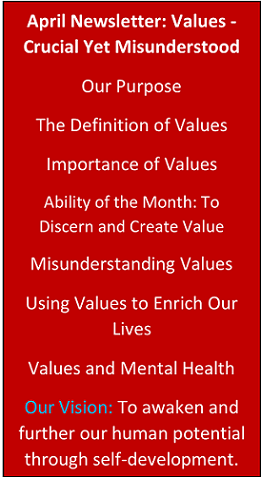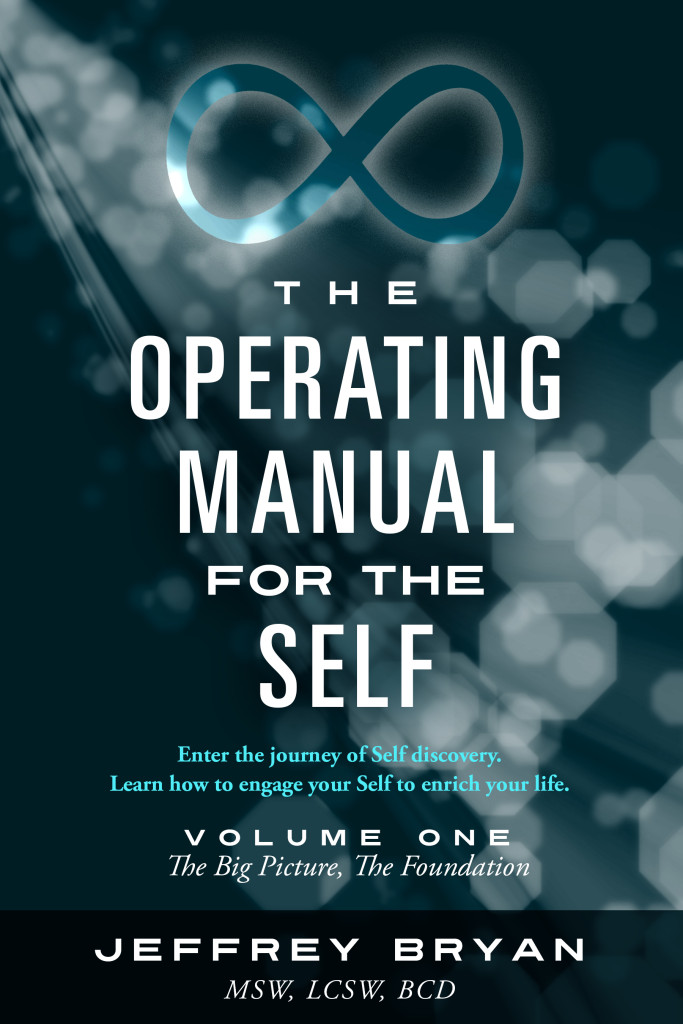 Values: Crucial yet Misunderstood, Part I Pdf Version
Values: Crucial yet Misunderstood, Part I Pdf Version
Our Purpose
An ongoing purpose of the newsletters is to provide the inspiration and tools (knowledge) that empower us to live our most fulfilling lives. We will see that understanding what values are and how to use them helps us to achieve and experience some of the “most valuable” aspects of life. Some of these aspects are:
- Success
- Motivation and effectiveness
- Happiness
- Authenticity
- Peacefulness
- Mental and emotional health
In this newsletter, we also clarify a misunderstanding about values that causes great difficulties and describe the negative effects of values conflict on mental health. The May newsletter will contain Part II of our exploration of values.
The Definition of Values
Values are beliefs (repeating thoughts held over time) that define what is important and what matters to us. There are being, doing and having values.
- Being values are beliefs about who we want to be as a person. They include character traits and qualities that we want to describe who we are. Two examples are “honest and loving.”
- Doing values are beliefs about what we want to do with our time, what actions we will take, and about what we will pay attention to (focus on). “I spend much of my time working because I value work.” “I talk a lot because I value self-expression.” “I pay attention to what I feel because I value my experience of feeling.”
- Having values are beliefs about the things, people, and experiences that we would like to have in our life. “I have a lot of money because I value money for its own sake.” “I have many children because I value children.”
We can also say that there are temporal values and timeless values. Temporal values have a specific person, place, time, and purpose. Culture and group membership also influence the choice of a person’s temporal values. An example of person, place and purpose: “Since I value the safety of my children, I value the crossing guard at the corner of the street. She/he helps my children cross the street safely.”
Timeless values exit without specific reference to person, place, time, purpose, culture or group membership. Honesty, freedom, love, health, happiness, joy, or, strength are examples of timeless values. Everyone wants these things all the time. However, to make meaningful statements about timeless values, they need to be made into temporal values; to be made personal for us. “I need the strength to tell my spouse that I am unhappy when he or she yells at me.” “Since I value freedom I will create more than one choice for myself in any given situation. That way I will have the freedom to choose.” Putting timeless values into action also makes them meaningful. “I value joy so I will listen to the music that brings me joy.”
The Importance of Values
Our values are a hugely important aspect of our life. In the being, doing and having they are part of what defines us as a person, defining our identity and self-image. Identity and self-image determine what we will think, feel, and do and therefore what our future is going to look like. As our values guide and direct what we pay attention to they are part of what creates our very experience of life.
We are very, very serious about what is important and what matters to us because we desperately want to experience our own value; that we are important and matter. We want to know that we have impact on others and on the world. Having impact helps us feel important and that we matter, which can seem like a life and death issue at times. Sometimes our destructive behavior is designed to demonstrate that we have impact.
As we are creating value we are creating what we put out into the world. As our world responds, what we consider important impacts us and our life. Recognizing this process teaches us more about how we create our life, and more about our power. Empowerment (recognizing our power) comes from the awareness that we create value and the role that it plays in our life.
- Point of Empowerment: Values give rise to desires, and we are acting on our desires every second of the day. If we are unaware that we create value, we live our life on auto pilot and miss the opportunity to create a more fulfilling life.
- Practice: To change your life change your desires. Know the values that give rise to your desires and change the values that are unfulfilling.
Ability of the Month: To Discern and Create Value
Our ability to create value is complex, involving thinking, feeling and sensing. Sensing is an intuitive faculty that allows us to “just know”, (like our sense of “fair play”, for example). In discernment, we use our mental abilities to think and to analyze as well as our emotional ability to determine what feels right to us. Utilizing the skill of discernment, we make the distinctions among our values that enables us to prioritize them. Prioritizing our values helps us make choices about how to use our time and therefore, how we will live our life.
I value me I value you
Misunderstanding Values
The misunderstanding about values is thinking that values are a “thing” in themselves. People take their values very seriously, being willing to “fight to the death” for their values. Rather, values are the result of the process of valuing. In valuing we decide what is important and matters to us. Understanding that values are the result of the activity of valuing (deciding what is important to us) points us in the direction of thinking about what we value rather than focusing on “our values”. We can then be less confrontational with other people about “our values” and less rigid within ourselves about “my values”. We can use the word values while understanding that the word points to something of value and not get lost in “overvaluing our values”.
People fight over “my values” without clearly defining what they are. Lack of clear definition makes “values” into something vague. If we are going to defend our values we need to be clear about what we are defending otherwise we create unending and irresolvable conflict. People will disagree about the priority of values. This is natural and inevitable, but this disagreement does not have to create unending and escalating conflict.
“I value freedom, safety, and peace of mind.” Everyone does, but how do we put these values into action when considering airport security, gun control and usage, and anti-terrorism methods? “People of good will” can disagree about these issues. Honest communication is necessary to resolved disagreements.
- Point of Empowerment: Values are the result of the process of valuing.
- Practice: Focus on the process of valuing and on what you value to develop inner peace, to be better able to resolve conflicts with others, and to develop mental and emotional flexibility. How do you decide what is of value to you? Deciding may be an experience that you can’t articulate but can have a sense about. Write down some ideas you may have about your method of determining value.
Using Values to Create Success, Motivation, Effectiveness, Happiness, and Authenticity
- Success is getting what we want in life. To get what we want we have to know what we want—what we value.
- To be successful we need the motivation to go after what we want. When we are motivated we will discover effective ways to get what we want. We are more motivated when we seek what we value.
- One source of happiness is fulfilling our needs. To accomplish this, we need to value the fulfillment of our needs (not ignore our needs). (Our needs are: Survival, safe/security, belonging/loving, self-esteem, to create/produce/know, self-actualization, and beauty/mystery/transcendence.)
- Authentic is “honest and true.” We experience authenticity when our actions and values reflect and express each other. For example: “If I value careful listening, I pay close attention to what others say. I am not impatient, eagerly waiting to get my turn to speak.” Or: “If I don’t talk much, my value of self-expression does not get acted on.” Being authentic and living authentically brings happiness and satisfaction. Authenticity brings a sense of wholeness and fulfillment of purpose.
Values and Mental and Emotional Health
We can see from our discussion how values affect our lives in positive ways. Can values affect our lives in negative ways? In the natural course of events, our values can conflict with each other. Most of the time we are able to resolve internal value conflicts. However, this conflict can be so intense that it disturbs our peace of mind with confusion, anxiety, guilt, and ultimately depression if the conflict cannot be resolved and becomes chronic. Anxiety, guilt and depression are mental/emotional health issues. For example: a classic value conflict occurs when we face a choice between giving something to one person (including yourself) versus giving something to someone else. “My mother is asking me to help her but I promised my friends that I would go to the movies with them. I want to do both, but at this moment in time I cannot. I have to choose one or the other.” There are circumstances that intensify the conflict to the point that it threatens our mental/emotional health. Some of these circumstances are:
- Intense and/or chronic conflict with my friends or mother
- Guilt from friends and/or mother
- Guilt about my friends, my mother or myself
- “I do not know what I want, do not know what my needs or values are, and do not value my needs.”
- “I cannot assert myself and say no.”
- Emotional pain and conflict
- Becoming confused so that issues cannot be thought about objectively
- Already feeling anxious and/or depressed
There are many other factors that can cause distressing internal conflict. Dealing with and resolving these circumstances is an involved process that takes time. However, we can address our value conflicts and achieve some degree of conflict resolution by using the process of values clarification. In the May newsletter, Part II, we will explore this process.
 The more you know about how you operate,
The more you know about how you operate,
the greater your ability to work with your values.
Consult The Operating Manual for the Self.
Let’s unite in developing our human potential. Share this newsletter with others. Please visit our website, IIFSD.org. We invite you to participate, (as suggested in the Participation Menu selection). When you buy The Operating Manual for the Self (manualfortheself.com), you support our vision and mission. When you read The Operating Manual for the Self, you leap forward in your personal self-development and evolution.
Copywrite IIFSD.org, April 2017. All rights reserved.

